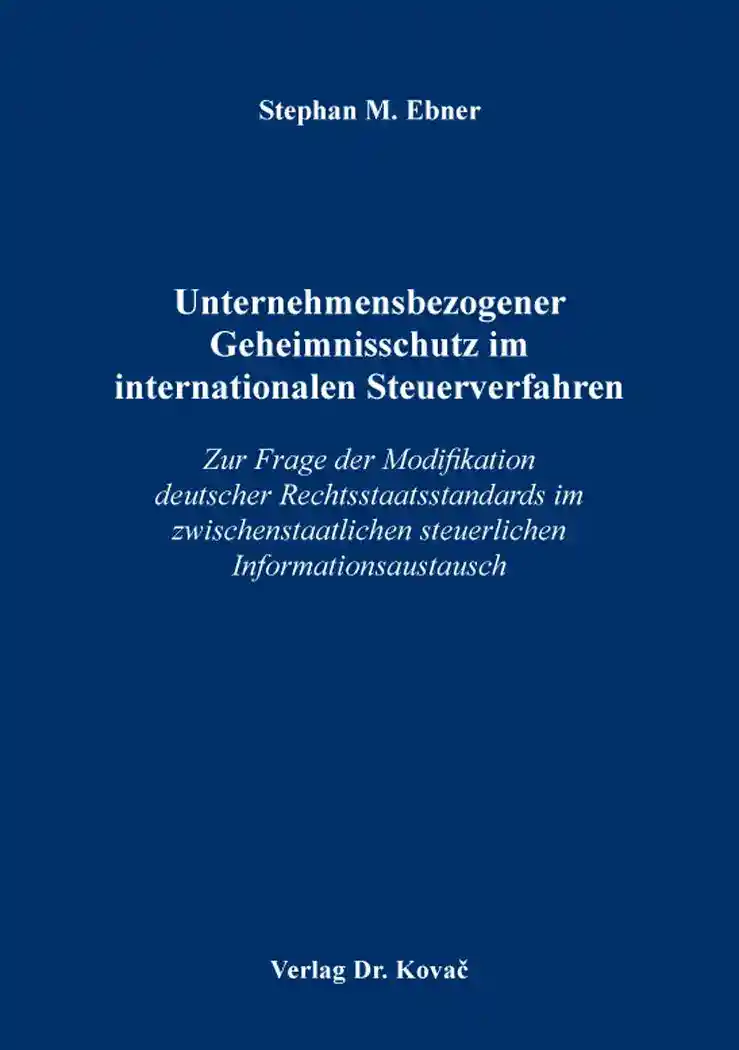Stephan M. EbnerUnternehmensbezogener Geheimnisschutz im internationalen Steuerverfahren
Zur Frage der Modifikation deutscher Rechtsstaatsstandards im zwischenstaatlichen steuerlichen Informationsaustausch
Steuerrecht in Forschung und Praxis, volume 129
Hamburg 2016, 624 pages
ISBN 978-3-8300-8751-9 (print) |ISBN 978-3-339-08751-5 (eBook)
About this book deutschenglish
The international mutual exchange of tax information between two or more countries usually is very time consuming. More dangerously, it could also be seen as a potential threat to corporate secrets. Needless to say, the protection of such data is important for the efficient functioning of highly developed economies. A simplification and therefore an amelioration of this tax-related exchange procedure could back up the US and UK as well as German economy, considerable costs should be avoided in this vein.
Such benefit might be achieved if German officials were allowed to lower constitutional standards in practice. Thus, under current law, German fiscal authorities must not transfer any tax information to a foreign country if it is not (absolutely) certain whether the receiving country does supply a constitutional level of the rule of law which is – at least comparable – to German standards. Theoretically, in every single exchange act, tax officials have to balance the relevance of the requested tax information with the impact on fundamental rights of a company (e. g. "Informationelle Selbstbestimmung, Artt. 2 Abs. 1 i.V.m. 1 Abs. 1 Grundgesetz") and the data security level within the foreign country’s respective financial authority system. Nevertheless, German tax authorities presently fully answer almost every tax information request from abroad. This although German officials do not have any opportunity to influence the use of data after the information has been transmitted to another country, of course. As a more adequate legal justification for this in the time of globalization, the author recommends the application of a "Concept of Trust" combined with establishing a joined tax authority between the USA, UK and Germany.
As a part of this doctoral project, the writer could manage to interview practitioners of the 2nd Senate of the Tax Court Cologne, the international law firm Freshfields Bruckhaus Deringer LLP and of the Federal Central Tax Office. He has also participated in the Visiting Researcher Programs of Saint Louis University School of Law (United States of America) and the University of Warwick School of Law in England. Thanks to a generous Dean’s Scholarship of Saint Louis University School of Law, he was able to strengthen his dissertation while completing SLU LAW’s LL.M. Program for Foreign Lawyers as well as being engaged in international tax law as a research assistant there. Last but not least, the author has incorporated his practical experience into this thesis working at Germany’s Federal Ministry of Finance and at the Research Services of the German Federal Parliament while counseling at the Berlin office of a leading tax law firm.
Keywords
AEOIAIAArt. 26 OECD MTCBusiness and Trade LawCommon Reporting StandardCompetent Authority AgreementConfidentialityConstitutional LawExchange of InformationFATCAFinancial SecrecyInternational LawLegal HistoryLegal TheoryPhilosophy of LawProtection of Corporate Tax InformationQualified Intermediaries (QI)Tax ProceedingsThe Rule of LawTIEAUS/UK Tax LawIhr Werk im Verlag Dr. Kovač

Möchten Sie Ihre wissenschaftliche Arbeit publizieren? Erfahren Sie mehr über unsere günstigen Konditionen und unseren Service für Autorinnen und Autoren.
